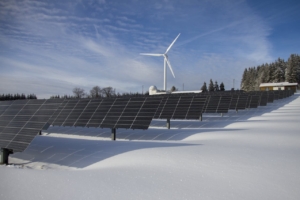Renewable Energy in Georgia
 Georgia is a country rich in history, situated at the eastern end of the Black Sea in Eastern Europe. Once home to the ancient kingdom of Iberia, Georgia is now charting its course with one of Europe’s most significant and rapidly growing renewable energy sectors. The Georgian people aim not only to promote renewable energy but also to use it to alleviate poverty.
Georgia is a country rich in history, situated at the eastern end of the Black Sea in Eastern Europe. Once home to the ancient kingdom of Iberia, Georgia is now charting its course with one of Europe’s most significant and rapidly growing renewable energy sectors. The Georgian people aim not only to promote renewable energy but also to use it to alleviate poverty.
Pushing Toward a Green Future
This push toward a green future goes hand in hand with the country’s economic policy. Specifically, Georgia has always maintained the goal of creating a liberalized economic environment for its people. This economy would be governed through minimal state interference, reduced taxation and free trade. These principles have already been put into place. For example, Georgia achieved an average annual economic growth of 3.6% between 2017 and 2021. The country achieved this by stimulating capital and investments through a system of structural reforms. Its renewable energy sector is one such reformation that has expanded into an industry of its own.
Georgia has been involved in the energy sector since the mid-’90s and its efforts have steadily progressed, yielding significant results. Approximately 70% of the country’s electricity comes from hydropower, with the remainder generated from coal and natural gas. This positions Georgia for potential energy independence from its neighbors, opening the door to becoming an electricity exporter to other European nations. For context, the country’s total energy consumption was 4.49 million tons of oil equivalent (Mtoe) in 2020, presenting a lucrative opportunity for sustainable economic growth.
In addition, the country’s energy sector is on pace for rapid growth. The state electricity producer Georgian State Electrosystem (GSE) currently produces 4,600 megawatts (MW) of electricity, which is expected to reach 10,000 megawatts by 2033. Furthermore, new hydropower plants are being proposed to aid this development. Even more, there are plans to construct photovoltaics and wind farms in the country. The fruition of these projects would have significant implications for the country’s renewable energy output.
Potential Economic Impact
The jobs created by this initiative could spark a significant economic boom for the nation. Citizens could engage in meaningful work within an industry, revitalizing their country and promoting a healthier environment. This potential is reflected in economic forecasts, which project Georgia’s gross domestic product (GDP) to rise to 5.5% by 2025, a 0.5% increase from the previous year.
Looking Ahead
There is still much work ahead and progress continues to be made. Georgia’s legislators are focused on realizing their vision of a green future by integrating and strengthening the economic and environmental sectors. Increasing these areas would foster sustainability and financial security for the nation and its citizens. In conclusion, renewable energy has brought much-needed attention to Georgia, establishing it as a significant player on the global stage in the pursuit of a brighter future.
– Drew Ellison
Drew is based in Laurel, DE, USA and focuses on Technology and Solutions for The Borgen Project.
Photo: Pexels
